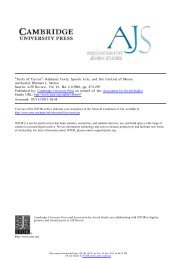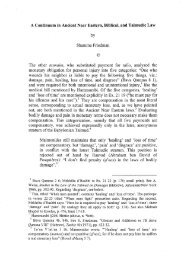Wimpfheimer_ Is it not so.pdf
Wimpfheimer_ Is it not so.pdf
Wimpfheimer_ Is it not so.pdf
You also want an ePaper? Increase the reach of your titles
YUMPU automatically turns print PDFs into web optimized ePapers that Google loves.
52 ❙ Barry <strong>Wimpfheimer</strong><br />
speci®c narratological deviceÐthe emotional marker. Through a close reading of<br />
these narratives, I hope to show analytically how the emotional marker, a seemingly<br />
gratu<strong>it</strong>ous detail, is the heart of a more textured understanding of these stories that<br />
puts law in conversation w<strong>it</strong>h the emotional real<strong>it</strong>ies of human life. In shifting the<br />
focus of these stories from their normative to their a²ective registers, I am<br />
attempting to undermine the ubiqu<strong>it</strong>y of law as a lens for reading even as I<br />
reintroduce a highly nuanced understanding of law as an important context for<br />
comprehending the a²ective lives of these stories. Though I am breaking law's<br />
monopoly on meaning by refusing to center my reading on the normative<br />
rami®cations of these narratives, I am pos<strong>it</strong>ing a thorough, detailed understanding<br />
of those very normative rami®cations as the necessary background for understanding<br />
a²ective meaning in these stories. This methodological choice allows me to<br />
re¯ect more generally on the relation between law and l<strong>it</strong>erature in the Talmud and<br />
on the role of halakhic narrative in rabbinic discourse.<br />
RAVA'S ANGER (BAVA METSI¦A 97A)<br />
Before examining this talmudic narrative, <strong>so</strong>me words about the legal basis of their<br />
discussion are necessary. Exod. 22:13±14 frames the liabil<strong>it</strong>y of a borrower for a<br />
borrowed animal through an exceptionÐthe case of owner presence. If the<br />
borrowed animal is maimed or dies outside the presence of <strong>it</strong>s owner, the borrower is<br />
liable. If, however, the owner is present, the borrower is <strong>not</strong> liable. Tanna<strong>it</strong>ic readers<br />
consider the pos<strong>it</strong>ive and negative formulations of this exceptional case redundant.⁴<br />
Compelled by the doubled verses, these readers replace the verses' physical <strong>not</strong>ion of<br />
``presence'' w<strong>it</strong>h their own idea of ``presence'' as a contractual cond<strong>it</strong>ion. The owner<br />
must be ``w<strong>it</strong>h the animal'' in contract. In further elucidation of this new <strong>not</strong>ion of<br />
contractual presence, tanna<strong>it</strong>ic <strong>so</strong>urces require the borrower to hire the owner e<strong>it</strong>her<br />
prior to, or simultaneous w<strong>it</strong>h, the hiring of the animal. This <strong>not</strong>ion of prior<br />
contractual presence forms the basis for the opening lines of our talmudic narrative.<br />
Rava⁵ said: A man who wishes to borrow <strong>so</strong>mething from his neighbor<br />
and yet be ab<strong>so</strong>lved of responsibil<strong>it</strong>y, should say to him, ``Give us a

















